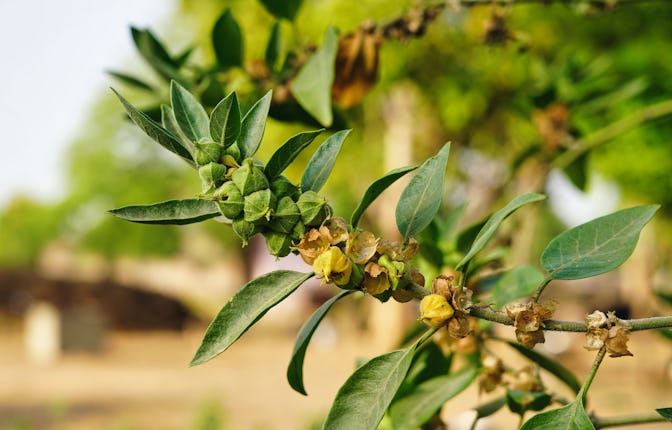Is Ashwagandha really the magic supplement TikTokers claim it to be?
Let's look at the science.

TikTokers love their “health hacks,” from internal showers (aka chia water) to brown noise and two–minute military sleeping. Recently, TikTok has been going wild over ashwagandha, a supposed miracle supplement that people swear works all kinds of magic for your body and mind. But with new treatments and supplements seeming to pop up every other day, it’s hard to keep up with what actually works – and what’s just wishful thinking. Here’s what to know about ashwagandha, according to the experts.
Ashwagandha, also known as winter cherry or Indian ginseng, is an herb derived from an evergreen shrub (specifically from its roots, leaves, or berries). The actual supplement is widely available in pill, powder, liquid, and even gummy form — and plenty of TikTokers have gotten their hands on it. The #ashwagandha hashtag alone has amassed over 500 million views, as users with massive followings tout how it’s changed their lives for the better, from physical and mental health benefits to improved libido.
“The first thing I noticed is insanely sharpened focus and memory,” said TikTok user @dalatifitness, explaining how the supplement impacted his health after a year of taking it. “After taking ashwagandha, I realized that whatever it was that I was doing in the moment, I was just so focused on it.”
Other TikTokers swear that taking the supplement has helped them regulate their emotions and allowed them to remain level-headed in situations that would usually overwhelm them with anxiety. “When I get bad news, or I feel something that used to tick me off, I just be like, okay, just think – don’t even stress out,” TikToker @mehlani_rose said in a video after taking ashwagandha supplements for three days: One gummy supplement in the morning and one at night, per her responses in the comments section.
And countless videos (mostly from men) focus on ashwagandha’s apparent ability to boost your libido. “I’m not saying go spend your fucking savings on it, but I’m not gonna lie, it did increase the glizzy a little bit,” TikToker @imreshaud said in one video. In fact, many videos refer to the supplement as “glizzy pills.”
But do these TikTok users’ claims actually have merit? It turns out there is some science to back them up. Ashwagandha is classified as an adaptogen — a plant or mushroom that helps the body cope with and adapt to daily stressors. And though it may be a recent discovery for a certain corner of the internet, ashwagandha isn’t new: In fact, it’s been used in traditional Indian medicine for centuries, mainly to reduce stress, fatigue, and anxiety; increase energy levels; improve muscle tone and strength; heighten focus and concentration; and yes, boost sex drive.
Multiple studies over the years have established a scientific basis for the therapeutic use of ashwagandha to reduce stress, inflammation, and blood sugar; strengthen the immune system, and more.
According to Healthline, the supplement has also been known to have anti-diabetic properties, support healthy sleep cycles, and boost testosterone and fertility levels in men. At least one study also found ashwagandha to improve sexual function in women as well.
In the U.S., ashwagandha is typically sold over-the-counter, without a doctor’s prescription. Although dosages may vary depending on your needs and the brand you’re using, research suggests taking between 250 to 500 milligrams daily for at least a month could deliver therapeutic effects. But as with any supplement or medication (and certainly any TikTok trend), it’s important to do your research and consider potential risks before introducing it to your body.
The most common potential side effects include nausea, headaches, drowsiness, stomach irritation, and diarrhea, according to Memorial Sloan Kettering Cancer Center (MSKCC). While ashwagandha is generally considered safe for most people, MSKCC notes it can be dangerous for pregnant people and people with hormone-sensitive prostate cancer, and can enhance the drowsiness effects of other prescription medications; per Healthline, it may also affect the thyroid, presenting potential risks for anyone with thyroid disease.
The bottom line? In a society riddled with daily stressors, where putting your best foot forward is always expected, it’s easy to see why ashwagandha has created such a fuss on TikTok. But, particularly if you have any preexisting conditions or are taking other medications, it’s worthwhile to talk to your doctor about taking ashwagandha supplements before actually introducing them into your daily routine. Just like with every other over-hyped health hack on the internet, it’s critical to do your research before diving into the deep end.